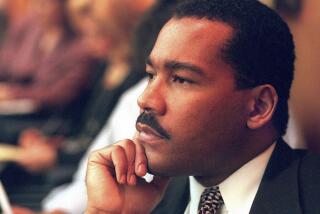Percy Foreman; Defended Martin Luther King Jr. Killer
- Share via
HOUSTON — Flamboyant defense attorney Percy Foreman, who bartered a guilty plea for the life of the man who assassinated the Rev. Martin Luther King Jr., died Thursday at the age of 86.
Foreman died of cardiac arrest, Methodist Hospital spokeswoman Brenda Koch said. Family members did not wish to release further details, she said.
He was a strapping 6-foot-4, 250-pound man with a flamboyant courtroom style employed most notably in divorce and murder cases.
In one trial, he continuously cracked a long black whip as he delivered a summation on behalf of a woman charged with killing her cattleman husband after he whipped her.
Foreman once estimated that he had tried 1,500 death penalty cases and that only one of his clients, a restaurateur named Steve Mitchell, was executed. Mitchell was convicted in 1952 of shooting his wife. Foreman, who consistently opposed the death penalty, said later that Mitchell “deserved to die.”
“You can’t win them all,” Foreman said of the case, but later confided that he blamed himself.
He persuaded James Earl Ray to plead guilty to the 1968 slaying of King, the Nobel Prize-winning civil rights leader, in exchange for a 99-year sentence. Ray charged later that Foreman pressured him into the plea by saying that the odds were 99% certain he would go to the electric chair if he faced a jury in Tennessee.
Ray contended that he only purchased the rifle used in the Memphis assassination and gave it to a man named Raoul. He charged that Foreman failed to investigate two mysterious Louisiana men who, he contended, would have helped his case.
But Foreman testified before a U.S. House assassinations committee in 1978 that Ray admitted to him that he faked the story of a conspiracy and thought the killing would make him “a hero to the white race.”
Foreman was born June 21, 1902, in a log cabin near the East Texas town of Coldspring. His first job was as a shoeshine boy in Polk County, where his father was sheriff. He began studying law after World War I and kept the $5 bill he received as the fee for his first legal case--drawing up a lease on a five-acre orchard.
Foreman reacted in character on April 30, 1982, when a woman whose divorce he had handled was arrested and charged with trying to hire someone to kill him.
“I’m too busy to die,” Foreman growled when asked for comment.
He built a practice based on unswerving loyalty to clients.
“They may not always be right, but they are never wrong,” he once said.
“In a murder case, you should never allow the defendant to be tried,” he explained. “Try someone else--the husband, the lover, the police, or if the case has social implications, society generally. But never the defendant.”
Foreman, who lived alone, leaves two children, William and Marguerite. Both of his wives died.
More to Read
Sign up for Essential California
The most important California stories and recommendations in your inbox every morning.
You may occasionally receive promotional content from the Los Angeles Times.













